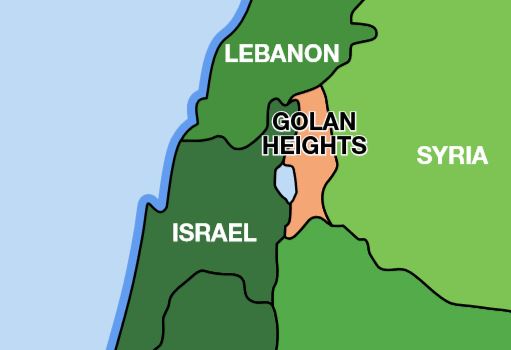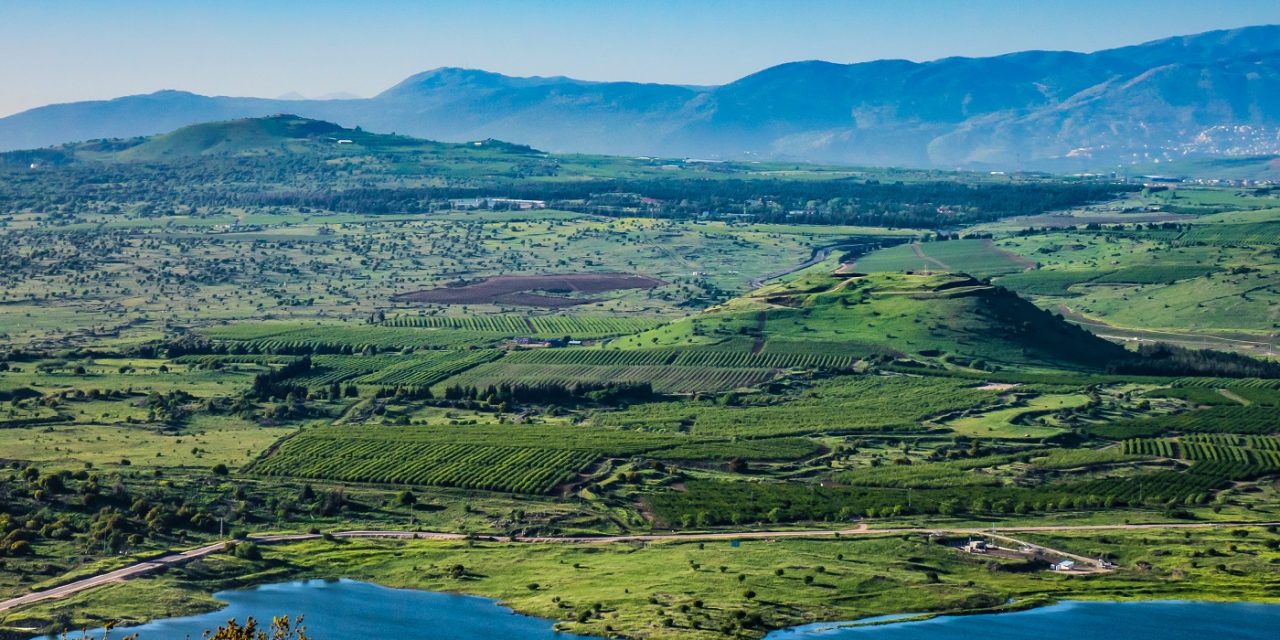The Golan Heights are a part of Israel historically, Biblically and legally.
When President Trump gave US recognition to Israel’s sovereignty over the Golan Heights in April 2019, as with the recognition of Jerusalem, Trump was simply acknowledging reality.
America’s decision was unprecedented, breaking from decades of misguided policies held by the international community that have only served to compound the threats to Israel and disrespect Israel’s interests and security needs.
Many in the world view the stretch of land at the north-east corner of Israel as just a hotly contested piece of disputed territory, with Israel commonly condemned as illegal occupier by the media, Western governments and the UN. But as this article explains, the Golan Heights are of great importance to Israel, both for its defensive advantages and crucially because it is rightfully hers to possess.
Furthermore, as we observe the emerging threats to the north of Israel, the timing of America’s acknowledgement is hugely significant.
A Biblical Connection
Archaeology reaffirms an undisputable Jewish presence in the area known today as the Golan Heights going back thousands of years. From ancient synagogues to Jewish towns, this elevated land with its hills, mountains and plateau was part of the ancestral home of the Jewish people, promised by God as an everlasting possession for the descendants of Abraham, Isaac and Jacob.
The place “Golan”, meaning “their captivity: their rejoicing” in Hebrew, is mentioned in the Bible as one of the “refuge cities” in a region called Bashan (Deut 4:43; Josh 20:8; 1 Chron 6:71). Bashan was located in land settled by the half tribe of Manasseh situated east of the Jordan River and Sea of Galilee.
Throughout the Old Testament, the Golan was the focus of a power struggle between the Kings of Israel and the Aramaeans who were based near modern-day Damascus.
A History of Attack
A Jewish presence in the Golan continued during the time of Jesus and for hundreds of years later until Muslim Arab armies conquered the region in 636 AD, violently adding it to the first Caliphate and severing the more than 1,600 years of continuous Jewish residence.
When the Ottomans conquered Syria, the Golan was described as being “almost entirely desolate”. This led the Ottomans to encourage refugees from the Russo-Turkish war to settle there. The Jewish presence was restored in Golan in 1886 when land was purchased by the Bnei Yehuda Jewish community.
After the fall of the Ottoman Empire, during which there was no such border, the Balfour Declaration and the San Remo Conference resolution designated the Golan Heights as part of the British Mandate for Palestine in preparation for a national homeland for the Jewish people. However an Anglo-French negotiation that followed saw the transfer of the Golan from the British Mandate of Palestine to the French Mandate of Syria in 1923, at about the same time as Britain divided its Mandate to create Transjordan, later known as Jordan. France didn’t give the Golan Heights to Syria until 1946 when it gained independence.

The Katzrin Synagogue in the Golan Heights built in the 6th century and later converted into a mosque after the Muslim conquest. It is one of 23 synagogues discovered in the Golan Heights.
A Strategic Necessity
The Golan Heights were used in June 1948 by Syrian forces who invaded Israel when Arab states launched an attack in objection to the creation of the State of Israel.
The territory was used again against Israel in the Six Day War of 1967 when Israel first took the territory in defence after being attacked. It was used again in the 1973 Yom Kippur War by Arab states, with Israel miraculously pushing back the onslaught against all odds.
Now under Israel’s control, Israel annexed the Golan Heights in 1981.
It continues to be a vital strategic stronghold for the Jewish state, which over the years has continued to experience the targeting of Israeli civilians living in the region.
In this context, the Golan Heights provides Israel with crucial military advantages to defend itself from any future attack.

A Legal Right
But what about Israel’s legal claim to the Golan Heights?
The UK government condemned President Trump’s acknowledgement of Israel’s annexation saying it is prohibited under international law. The EU also reacted stating it does not recognise Israel’s sovereignty over the area. They are wrong.
International law states that if a country aggressively invades and occupies another country and then annexes it, it is illegal.
However, if a country itself is attacked and in the course of defending itself takes territory that is necessary for defence, it is not only legal under international law for that country to occupy the territory, but it is a moral imperative.
Under the UN Charter, defensive action is not illegal and throughout history countries have obtained territory gained in their own defence. Yet the UN persistently condemns Israel’s possession of the Golan Heights and fails to recognise its legitimate claim.
In the past Israel has offered Syria the Golan Heights in exchange for peace, but all approaches have been rejected.
If Israel accepted calls from the international community, including Britain’s Foreign Office, to return the Golan Heights, it would mean that Israel has to surrender strategic territory to people who want to attack them. The threat is no longer just Syria, which is one of the countries that attacked Israel in the Six Day War. It is now Iran whose regime has repeatedly declared it wants to wipe Israel off the map and is using Syrian territory to strengthen its arm.

A Moral Imperative
It is morally wrong for Britain and any other country to expect Israel to set aside its legal rights to the Golan Heights and its obligation to protect its people and its Sovereignty.
When Trump gave US recognition, he effectively placed the Golan Heights alongside Jerusalem as being off the table in any future peace talks. He also sent a clear message to Israel’s enemies that America has Israel’s back.
Today with Iranian military having a foothold in Syria and with its proxy Hezbollah located just across Israel’s border, Israel is not going to surrender the Golan Heights, and neither should they.
Iran is constantly trying to approach the Israeli border on the Golan Heights, and the area has already seen cross-border rocket attacks which were organised by the Quds Force of the Islamic Revolutionary Guards Corps.
According to the White House, “To allow the Golan Heights to be controlled by the likes of the Syrian and Iranian regimes would turn a blind eye to the threats emanating from a Syrian regime that engages in atrocities and from Iran and terrorist actors, including Hezbollah, seeking to use the Golan Heights as a launching ground for attacks on Israel,”
If Western governments are genuinely interested in peace and want to send a clear condemnation against terror and aggression, they would be wise to support Israel’s undisputable Sovereignty over the Golan Heights.
———————————————————-
Copyright: Christians United for Israel UK
Featured in Torch Magazine, Spring 2019










